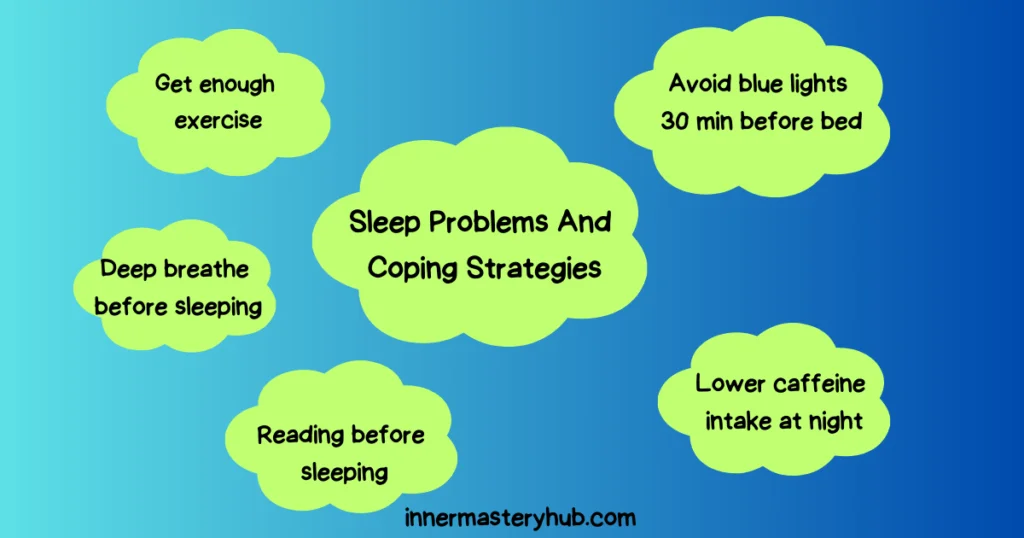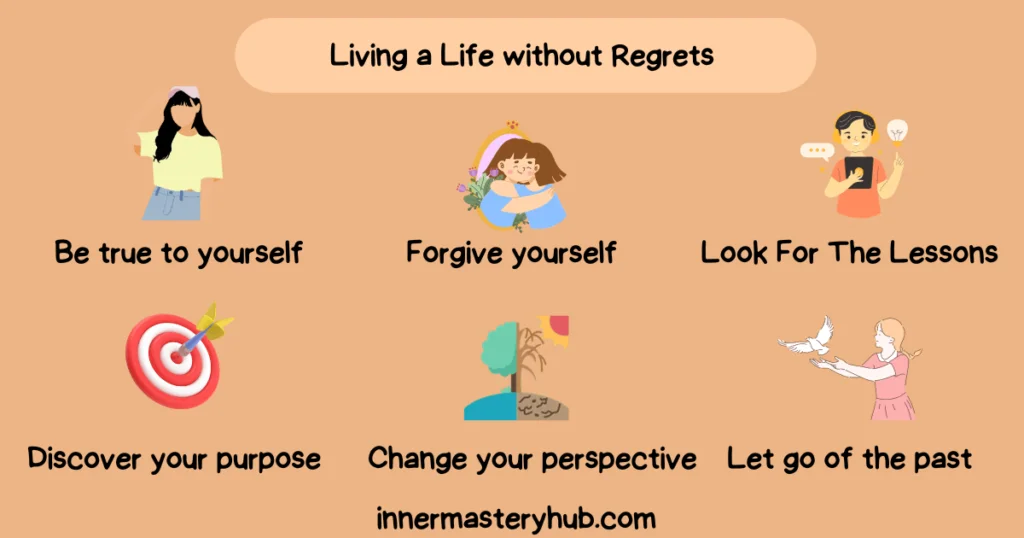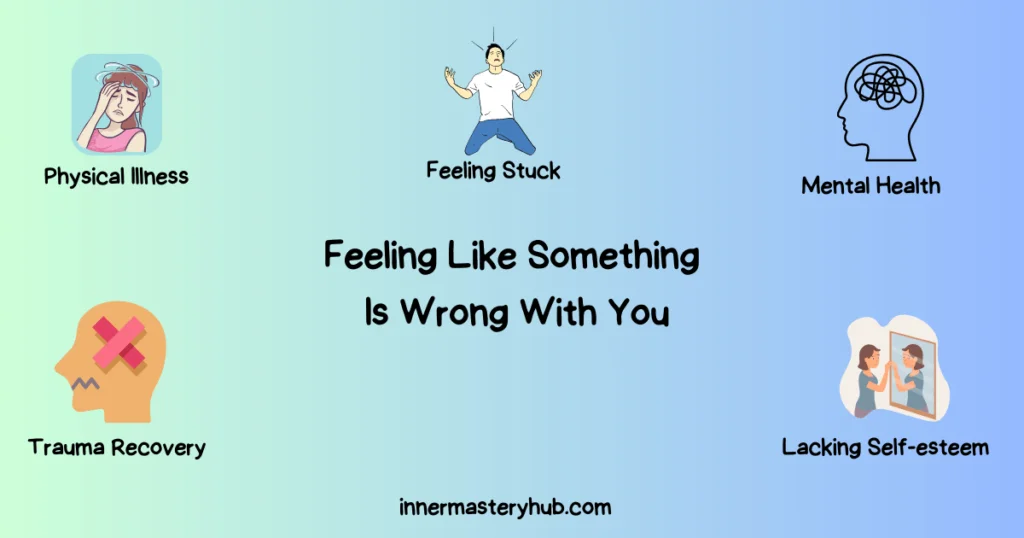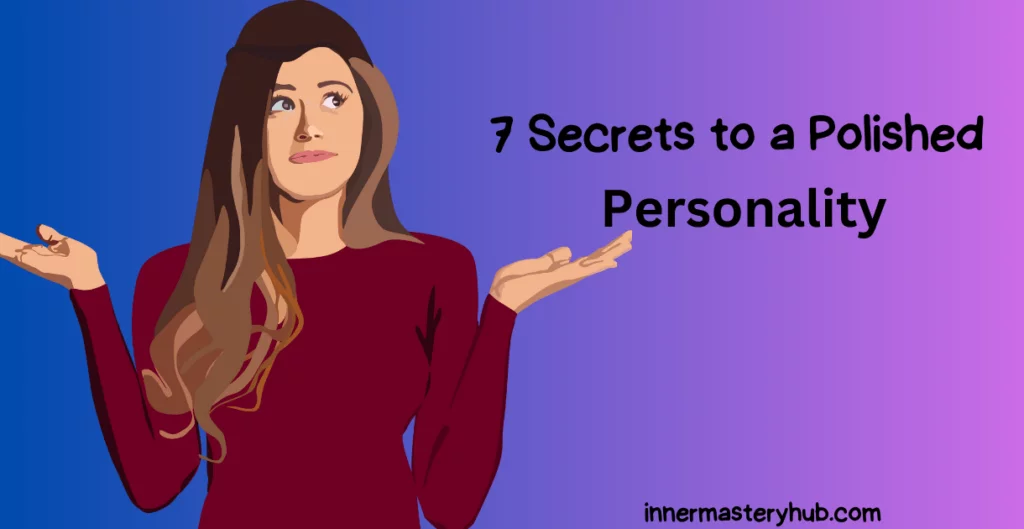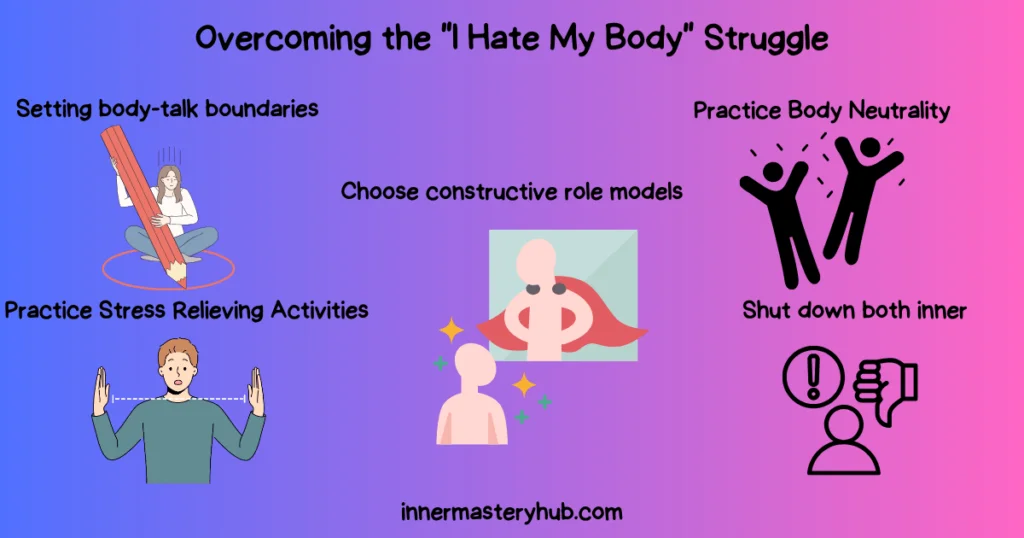
Have you ever experienced a wave of self-loathing when staring in the mirror? Throughout the world, countless individuals battle with the phrase, “I hate my body,” and a poor body image, constantly listening to their critical inner voices that point out their defects.
But what if we could find a method to regain control of our bodies and develop a loving, healthy relationship with ourselves rather than succumbing to this negativity?
This blog entry discusses how to stop hating your body. We’ll examine cultural pressures and unachievable beauty standards as contributing factors to body hate. We will also examine the negative impact that a negative body image has on our mental and physical health.
RELATED: The Journey to Self-Love
Table of Contents
What Is Self-Hatred when it comes to “I hate my body.”
A deep hate or contempt for oneself is called self-hatred or self-loathing. Low self-esteem, inadequacy, and negative self-perceptions can cause this difficult mood.
Imagine a constant black cloud of criticism, judging and highlighting your flaws. That’s self-hatred. It can affect your thoughts, feelings, and actions.
People who hate themselves often engage in negative self-talk and focus on their perceived flaws and failings. They may focus on past mistakes and unfavorable experiences or repeat the sentence,” I hate my body,” often.
Shame and fear of judgment can cause people who despise themselves to retreat from social contacts and relationships. They may withdraw to avoid feeling exposed or vulnerable.
RELATED: Discover the Top Self-Esteem Books to Transform Your Inner Life
Addressing the Root
Addressing self-hatred necessitates first acknowledging its existence and then chipping away at the “I hate my body” perspective that lies at its core. Here are some actions you could take:
Challenge negative thoughts, Don’t let your inner critic run wild. Call into question its pronouncements. Are they truly impartial, or are they skewed by previous experiences or unreasonable expectations?
To practice self-compassion, treat yourself as you would a close friend going through a difficult situation. Remember to forgive yourself, appreciate minor successes, and be kind to yourself.
RELATED: Embracing Quiet Confidence: Unlocking Inner Strength and Self-Assurance
A Negative Self-talk, “I hate my body,” Causes Other Disorders
Negative self-talk, “I hate my body,” can cause many mental and physical health issues. Like a gloomy cloud, it affects your thoughts, emotions, and actions, causing negative events.
Depression: Perceiving yourself as worthless, insufficient, or a failure can cause pessimism and despair. A vicious loop might impair the self-image, “I hate my body.”
Self-doubt, “I hate my body,” can cause social anxiety and the fear of being judged or scrutinized. You may avoid social events or feel anxious about being judged.
Disorders of eating: Anorexia, bulimia, binge eating, and poor diet can result from a biased body image and constant self-criticism. These diseases sometimes result from a desperate attempt to manage your body and meet an unachievable goal.
RELATED: Unearthing the Source: The Root of Suffering Revealed
Signs for Mental Health Issues
A bad self-image can make you self-conscious and affect your mood, emotions, and well-being. Know the symptoms that poor self-perceptions are affecting your mental health.
You are feeling stress due to poor self-talk, “I hate my body.”
You’re stressed out due to low self-esteem. Your self-doubt and uncertainty make every moment difficult. The mirror becomes an enemy, displaying perceived imperfections that exacerbate the anguish.
Comparing yourself to an idealized self makes you feel ugly, inadequate, and overwhelmed. Negativity makes self-acceptance appear unattainable.
Your mind bears stress, fighting self-criticism and the need for validation. Internal tension and negative self-perception cloud the path to confidence rediscovery.
RELATED: Decoding the Mind: Compulsive vs. Impulsive Behavior Explained
You Experience Dysphoria
Dysphoria caused by low self-esteem is like navigating an emotional storm. This fundamental separation from one’s body makes every reflection and physical aspect uncomfortable and distressing—self-doubt and inadequacy battle in the mind.
You constantly compare yourself in social encounters, which makes self-acceptance harder. The need to match looks with identity becomes a struggle.
Each day is filled with anxiety, making it hard to find comfort or connection. Therapy, self-affirmation, and understanding allies are essential to reconcile internal perceptions with external reality and improve self-image.
RELATED: Decoding Anxiety neurodivergence
Experiencing body Dysmorphia
Dysmorphia caused by low self-esteem is like living in a constant storm of self-criticism and erroneous perceptions. Every reflection magnifies perceived imperfections beyond reason, generating a pervasive discomfort in your daily life. Analyzing one’s looks causes excessive anxiety, making socializing difficult without fear of criticism.
Since perceived symptoms of body dysmorphic disorder deepen a sense of shame and inadequacy, this emotional turmoil typically leads to separation from others. To find comfort, compulsive behaviours like grooming and mirror-checking become temporary coping techniques.
The effects ripple through relationships, creating an unhealthy self-conscious image that tarnishes your self-identity and well-being. Dysmorphia is difficult. Thus, professional help is essential for self-acceptance.
RELATED: Taming Your Scattered Thoughts for Creative Breakthroughs
You feel triggered
Body dissatisfaction triggers caused by low self-esteem can cause even minor things to cause severe emotional reactions. These catalysts revive deep-seated fears and self-doubts. Passing comments, glances in the mirror, or unflattering photos might trigger perceived defects, making the person more vulnerable.
The emotional response is intense, from anxiety and self-consciousness to despair and frustration. Triggers reinforce self-criticism and inadequacy. Avoiding triggers and dealing with their emotional effects makes daily life a delicate ballet.
RELATED: Triggers For Empaths: Recognizing and Managing Emotional Overload
Develop Love for Your Body
Start by changing the way you think about your body. Instead of focusing on its apparent shortcomings or image, “I hate my body,” start to appreciate its assets and powers. Adopt self-care routines that put your physical and emotional health first and cultivate appreciation for your body’s resiliency.
Be in the company of positive people, whether through encouraging relationships or media that affirms and promotes various body forms. Participate in joyful and fulfilling activities to help establish a positive connection with your body.
You may also practice self-love by identifying and disputing negative ideas and substituting them with acceptance-promoting mantras. A better and more loving relationship with the body that carries you through life is built on acceptance of your body as it is and nurturing activities.
RELATED: Conscience vs. Conscious: Demystifying the Difference
By Setting Goals
Set goals that are both good and practical, with an emphasis on general well-being as opposed to precise weight or appearance targets. Think of objectives related to self-care, emotional wellness, and physical fitness. Break down more ambitious objectives into more manageable tasks to increase your sensation of accomplishment.
Highlight accomplishments by highlighting your strength, endurance, or improved mood. Include various enjoyable activities to help you develop a healthy relationship with movement and exercise.
By establishing objectives focused on self-acceptance and self-compassion, you can counteract negative self-talk, “I hate my body.”
Choose constructive role models.
Find role models with these values and aims, such as personal growth and resiliency. These could be social justice crusaders, athletes pushing their limits, or artists expressing themselves. Find authentic, relatable role models.
Find people openly discussing their troubles and successes to show that everyone is imperfect. You can relate to their path and draw inspiration from their vulnerability.
Look beyond beauty standards for role models. Honor diversity in physical types, talents, and races. Following those who defy norms can expand your concept of beauty and empower you to be yourself.
Role models are meant to inspire, not intimidate. Don’t pressure yourself to conform to someone else’s image or path. Focus on learning from your role models’ qualities and achievements, not replicating their exact physical appearance.
Your journey is unique and valuable. Use your role models as stepping stones to discover your strengths and passions and to overcome negative self-images like, “I hate my body.”
RELATED: Breaking Free from Self-Abandonment: A Path to Self-Healing and Empowerment”
Consider different perspectives
Considering our genetics, such as receiving traits from our parents, reveals our DNA’s uniqueness. Accepting this uniqueness and acknowledging that physical traits change with cultural expectations and environmental factors can be liberating enough to love your body. It encourages emphasizing inherent traits over external criteria.
RELATED: Exploring the Complexities of Racial Ambiguity
Striving for a healthy lifestyle
Choosing a healthy lifestyle over fad diets is essential to your body image. Popular diets and poor body image increase the likelihood of eating disorders. Flexible nutrition plans improve physical health and empower people by giving them control over their diets.
List Your Body’s Strengths
Sometimes, we get so caught up in feeling ashamed, like our bodies aren’t good enough, that we forget their incredible abilities. When you hate your body, listing its successes can help. This can make you proud of your body’s best efforts.
Practice Body Neutrality
Body neutrality replaces self-criticism with acceptance of one’s body, including its strengths and shortcomings. This includes enjoying one’s body’s benefits despite beauty standards. Body neutrality also requires smart eating and avoiding severe exercise.
Respecting our internal indications and requirements for movement and rest is key. Body neutrality benefits us beyond our bodies. It promotes empathy, and self-compassion, reduces anxiety and stress, and enhances mental health.
Setting body-talk boundaries
Taking control of the story requires clear guidelines for friends and family to reduce triggers. Find out what body-related comments bother you. Are you receiving unsolicited beauty advice? Diet talk? Body weight or size comparisons?
Explain what makes you uncomfortable. Do not hesitate to express your boundaries. You can say, “I’m not comfortable discussing my weight,” “Please abstain from remarking on my body,” or “I’d rather not discuss diets. Can we shift our focus?”
This may involve stating safe and uncomfortable conversation topics. Minimize communication or gracefully end the interaction if someone regularly breaks your rules. Your health comes first.
Practice Stress Relieving Activities
Chronic stress can damage our emotional and physical health, including body image. Tension-relieving hobbies help manage tension and improve self-acceptance.
For a few minutes, breathe slowly and deeply from your belly. Focus on your chest rising and falling and air entering and leaving your body. Work up from your toes to tense and release muscles. Notice your body relaxing and tension releasing. Many free guided meditations online or in apps can help you relax and focus. Practice Yoga and stretching to relieve muscle tension and increase flexibility.
List your favourite physical traits and appreciate them.
Instead of focusing on negative bodily traits, Dr. Kimberly Daniels, a clinical psychologist specializing in overeating and binge eating disorders, recommends focusing on positive aspects.
Celebrate body activities
Instead of seeing exercise as a way to modify your body, embrace it as a celebration of its abilities. Enjoy the feeling of movement, finishing a workout, or connecting with nature during a walk.
Concentrate on skills and appreciate your body’s abilities. Do you have the ability to run for weight maintenance or move large objects? Honour these abilities and what your body can do.
Exercise and appreciate a body part daily. Consider the function and how it enhances your worldview and any accompanying memories. Eliminate damaging social media accounts by prioritizing diversity and body positivity above artificial beauty standards.
RELATED: The Timeless Elegance of the Feminine Woman: Embracing Inner Strength
Focus on strength and wellness.
Emphasis on strength and wellness, not just the scale! Your fitness-over-size running experience is powerful. Progress isn’t always measured. Move beyond the scale and listen to your body’s progress signs.
Set goals based on your body’s abilities, not appearance. Plan to run a specified distance, lift a specific weight, or execute a specific workout.
Shut down both inner and external critics.
When critical thoughts occur, challenge their validity. Consider “Would I say this to a friend?” and reframe the concept positively. Give yourself the same compassion you would a loved one. Let go of negative notions like, “I hate my body,” and negative self-perception and accept yourself.
Imagine being confident and comfortable in your skin. Say, “I am worthy of love and respect,” or “My body is strong and capable.”
Set boundaries in your relationships. You can refuse unpleasant body comments. Explain how harmful words affect your self-esteem. If someone frequently breaks your boundaries, limit contact or stop the relationship. Your health comes first.
RELATED: Locus of Control Theory In Psychology: Internal vs External
FREQUENTLY ASKED QUESTIONS
What does it mean if I hate my body?
Negative body image: dissatisfaction with physical appearance, possibly influenced by societal standards, impacting mental and emotional well-being.
How do I stop hating my body so much?
Practice self-love, focus on strengths, challenge negative thoughts, seek support, prioritize health over appearance, and embrace uniqueness.
Why am I so unhappy with my body?
Social comparison, unrealistic standards, media influence, past experiences, or mental health issues may contribute to dissatisfaction and unhappiness with your body.
How do I start accepting my body?
Cultivate self-compassion, appreciate body functionality, challenge unrealistic standards, surround yourself with positive influences, and prioritize overall well-being.
What is the psychology of hating your body type?
Negative body image often stems from societal pressures, comparison, trauma, or mental health factors, impacting self-esteem and overall well-being.
FAQS
How do we improve body image and self-esteem?
To improve your body image and self-esteem, prioritize self-care, accept your body’s strengths, say positive affirmations, surround yourself with encouraging people, and live a healthy lifestyle. Fight negative ideas, celebrate your accomplishments, and seek professional help if necessary. Take your time and be gentle with yourself while you learn to appreciate yourself.
Tips for developing a positive body image.
Create a positive body image by being kind to yourself, noting the good things your body can achieve, and concentrating on your health rather than your appearance. Surround yourself with people who are supportive of your body, challenge social beauty standards, and do activities that make you happy. Accept diversity and remember that your worth goes beyond your appearance.
Coping mechanisms for negative body thoughts
Mindfulness, changing your focus to good things, and challenging unrealistic expectations can all help you combat negative body ideas. Develop self-compassion, utilize affirmations to combat negative ideas, and seek guidance from friends or specialists. Do things that make you feel good about yourself, and remember that your worth is not solely determined by your physical looks.
Mindfulness techniques for body acceptance.
People can learn to embrace their bodies through mindfulness practices. Do body scan exercises and pay attention to your emotions without judging them. Practice becoming aware of and acknowledging your body-related thoughts and feelings without attributing any meaning to them. Be present in the moment and compassionate to yourself. Mindfulness allows you to connect more profoundly with your body, leading to greater acceptance and fewer negative thoughts.
Transforming negative body talk into positive affirmations.
Instead of using negative body language, try stating good things. Catch your negative thoughts and redirect them so that you may concentrate on loving and accepting yourself. Repeat positive affirmations that highlight your body’s abilities and uniqueness. This practice has the potential to modify your mindset over time, resulting in a more positive and loving connection with your body.


